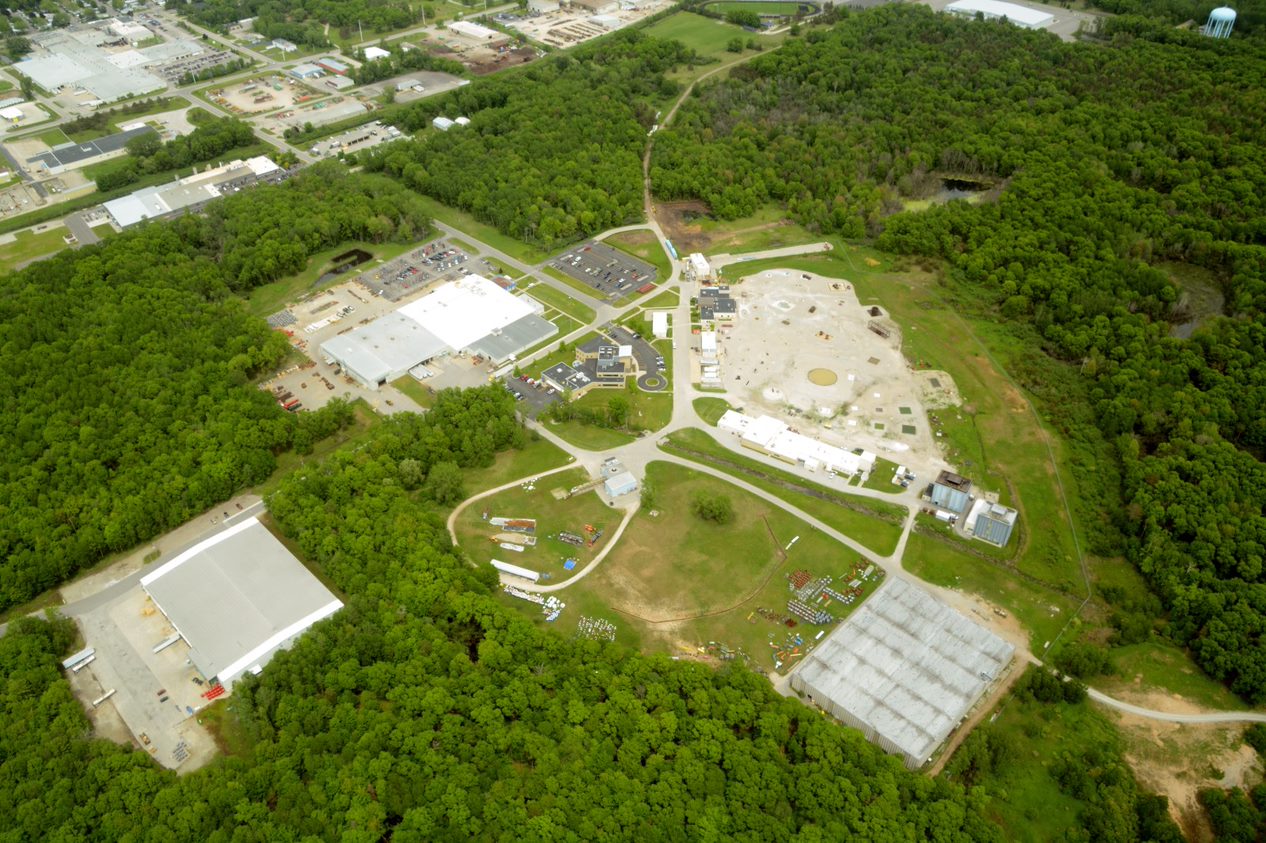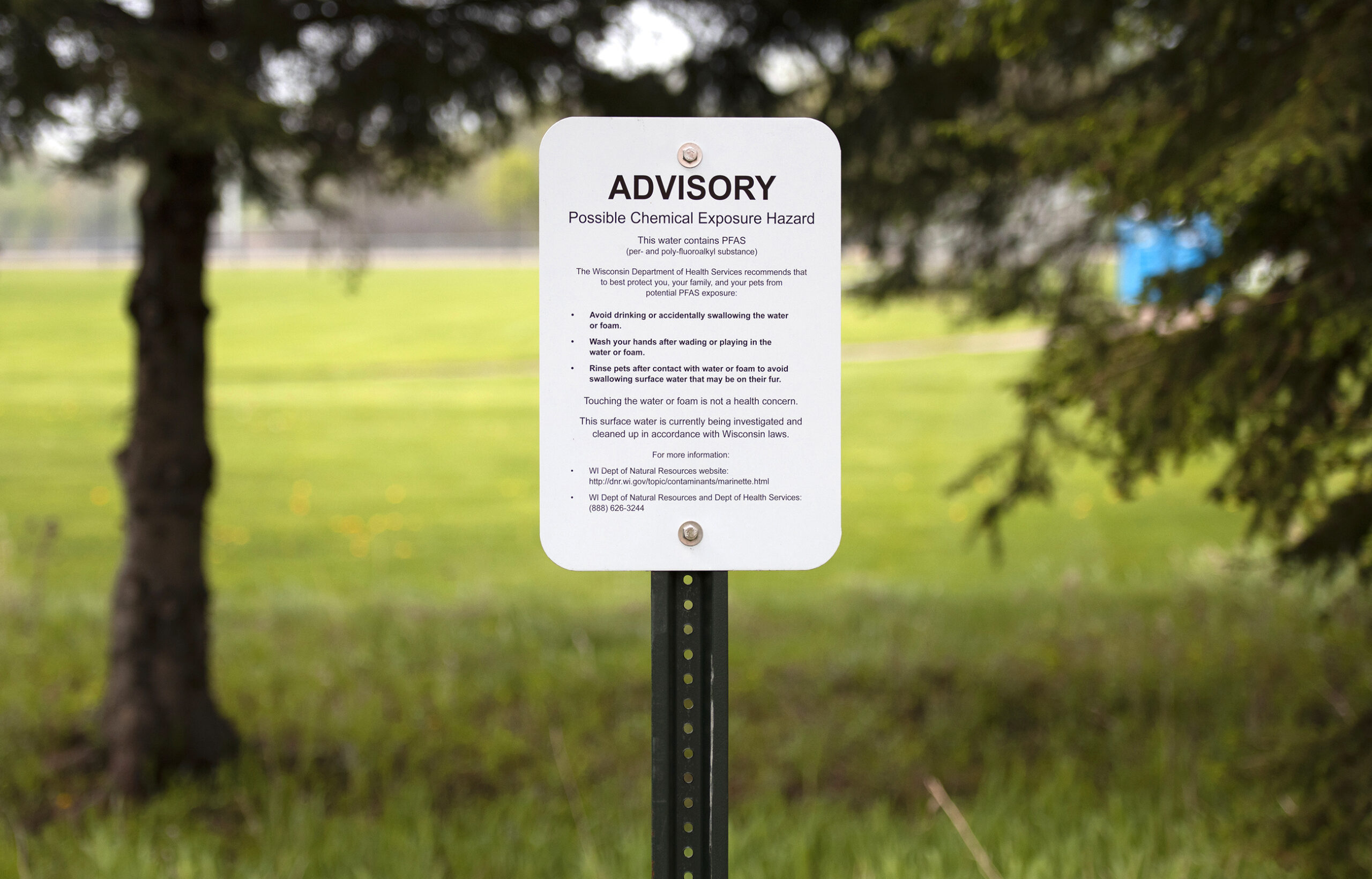Wisconsin environmental regulators have signed off on Tyco Fire Products’ plans to treat PFAS contamination in groundwater stemming from its fire training facility in Marinette. The Wisconsin Department of Natural Resources warns the system will reduce, but not eliminate, the so-called forever chemicals in groundwater and surface water over the next 30 years.
The contamination is linked to Tyco’s use of firefighting foam that contains PFAS, or perfluoroalkyl and polyfluoroalkyl substances. The Marinette manufacturer conducted testing and training with firefighting foam that contains PFAS at its 380-acre facility from the early 1960s through 2017. Town of Peshtigo residents who live in an area that includes roughly 270 households are receiving a $17.5 million settlement from Tyco after being exposed to the chemicals, which have contaminated private wells.
Tyco, which is part of Johnson Controls International, submitted a 2,400-page design for the groundwater extraction and treatment system in February. The system includes a series of nine wells that will be installed to pump contaminated groundwater into pipes that will deliver it to a treatment system on the property.
News with a little more humanity
WPR’s “Wisconsin Today” newsletter keeps you connected to the state you love without feeling overwhelmed. No paywall. No agenda. No corporate filter.
The company aims to build the treatment system and get it up and running by the end of the year. The system will not clean up pollution throughout the entire area or address the contaminated wells in the town of Peshtigo. The DNR is also requiring Tyco to obtain permits and submit plans for monitoring, operation and maintenance as conditions for approval.
“The DNR thanks JCI/Tyco for its plans to implement an interim action that is designed to remove per- and polyfluoroalkyl substances (PFAS) mass from the environment and reduce further spread PFAS from the site,” the agency wrote in a May 18 letter.
The system is designed to address the highest concentrations of PFAS beneath Tyco’s facility and east of its property where levels greater than 10,000 parts per trillion and as high as 72,000 parts per trillion have been found. It’s not expected to bring levels in line with the state’s proposed groundwater standard of 20 parts per trillion for six PFAS substances, including PFOA and PFOS — the two most commonly studied PFAS chemicals.
The system will include proven treatment technologies that include granular activated carbon to remove PFAS from groundwater before it’s discharged into a nearby ditch that runs through the city of Marinette into Green Bay. Discharges will be monitored and regulated by the DNR under a wastewater permit.
In a statement, Tyco said it appreciates the DNR’s positive response to the company’s plan for treating the contamination at its site.
“Their conditional approval will allow us to get started on the most important phase of remediation — removing PFAS. We are pleased that we are aligned with WDNR on the path forward,” Kathleen Cantillon, environmental communications director for Johnson Controls, said in the statement.
Tyco has said it expects the treatment system will reduce PFAS contamination in groundwater by 95 percent, prompting scrutiny from some residents during a DNR listening session Wednesday.
“Is there anything in the engineering report that you’ve just given preliminary approval to that shows 95 percent of the PFAS would be removed in 30 years or beyond?” asked Doug Oitzinger, Marinette City Council member.
There would be a reduction, but a significant amount of PFAS will remain, said Alyssa Sellwood, Johnson Controls International project manager for the DNR.
“There is not a 95 percent reduction in the overall amount of material that’s within the groundwater plume within that 30 years,” Sellwood said.
Sellwood said the system may reduce upwelling of PFAS into surface water by that amount, but the DNR contends the company’s models show more than 40 percent of PFAS currently within groundwater will remain in water even after the system has operated for 30 years.
The DNR has also updated guidance that advises residents in the area to avoid watering gardens with water that contains PFAS levels above the state’s proposed groundwater standard.
State environmental regulators expect more work may be needed to reach cleanup goals.
Tyco is still investigating the extent of contamination in the area, but it refused regulators’ demands to test more wells in an expanded area around its facility last year. The company has said its contamination is confined to an area immediately surrounding its facility and asked the DNR to pinpoint other potential sources of pollution.
The state hired an environmental engineering firm last year to sample hundreds of wells for the presence of PFAS in the expanded area around Tyco’s facility.
The DNR’s contractor has completed sampling on 395 wells so far — the majority of which contained PFAS chemicals. However, PFAS levels were below the state’s proposed groundwater standard for most wells. PFAS concentrations between 23 and 110 parts per trillion were detected in 20 wells. The DNR found no detectable levels of PFAS in 84 wells.
The company has said the vast majority of wells contain no trace of the chemicals while Tyco has provided around 140 residents with bottled water or filtration systems.
Peshtigo and Marinette were among the first communities in the state to grapple with pollution from PFAS. The chemicals have raised concern in recent years because research has shown they’ve been linked to harmful health issues, including thyroid disease, infertility and testicular cancer. The chemicals are found in firefighting foam and everyday products like nonstick cookware, and they don’t break down easily in the environment.
Tyco was aware of PFAS on its property in 2013, but it didn’t notify regulators that the chemicals had spread outside its facility until late 2017. Attorneys for Peshtigo residents have argued the site’s former owner Ansul, a chemical company bought by Tyco in 1990, was aware of the environmental concerns regarding its firefighting foam as early as 1977.
The DNR referred Tyco to the Wisconsin Department of Justice in 2019, and Gov. Tony Evers’ administration has said it’s seeking an outside law firm to prosecute companies responsible for PFAS pollution. Johnson Controls and Tyco have said they believed contamination was contained to their property.
The company has said it’s committed to paying for a municipal water line between Marinette and Peshtigo to provide a permanent source of safe drinking water for residents. Last fall, the Peshtigo town board unanimously passed a resolution to move forward with exploring Marinette’s water supply as a source of drinking water.
As awareness has grown, state regulators have identified nearly 70 sites statewide that are contaminated with PFAS. Those include industrial areas and waterways in Superior, Madison, Milwaukee and La Crosse. Wisconsin lawmakers passed a bill that Evers signed into law last year that bans the use of firefighting foam containing PFAS except in emergencies and limited circumstances.
Since then, Republican lawmakers have weakened an emergency rule outlining proper testing, treatment, storage and disposal as part of carrying out the law. They also introduced a bill this session to prevent the DNR from setting levels for treatment as part of any rule enforcing the new law.
The Environmental Protection Agency has yet to develop standards for PFAS, but it has issued a health advisory level of 70 parts per trillion — the equivalent of one drop of water in an Olympic-sized swimming pool. Efforts to regulate the chemicals were delayed under the Trump administration, but the Biden administration is now moving to set a drinking water standard for PFOA and PFOS.
In the absence of federal guidelines, Wisconsin is crafting its own PFAS standards for drinking water, groundwater and surface water. That process could take another year before any standards are in place.
The Evers administration has released a PFAS action plan with 25 steps for addressing PFAS that includes holding polluters accountable and widespread testing for the chemicals. The governor proposed more than $20 million in the next two-year state budget for addressing PFAS contamination. Evers and Democratic lawmakers have reintroduced their own bill this session to combat PFAS contamination.
Wisconsin Public Radio, © Copyright 2025, Board of Regents of the University of Wisconsin System and Wisconsin Educational Communications Board.






